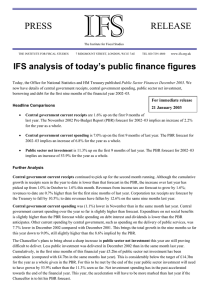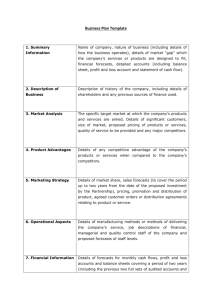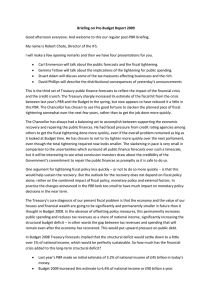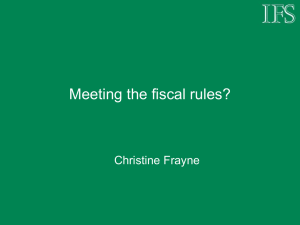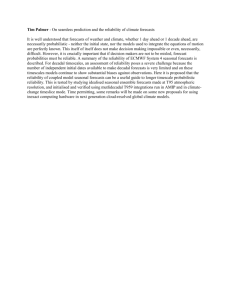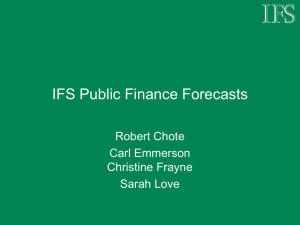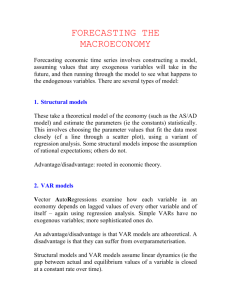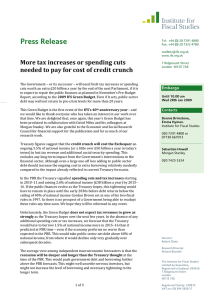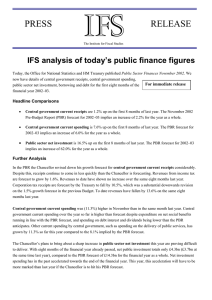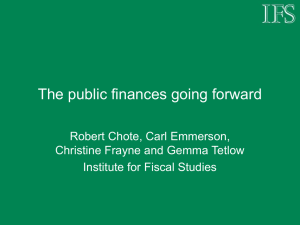Budget 2003 Briefing Institute for Fiscal Studies www.ifs.org.uk/budgetindex.shtml
advertisement
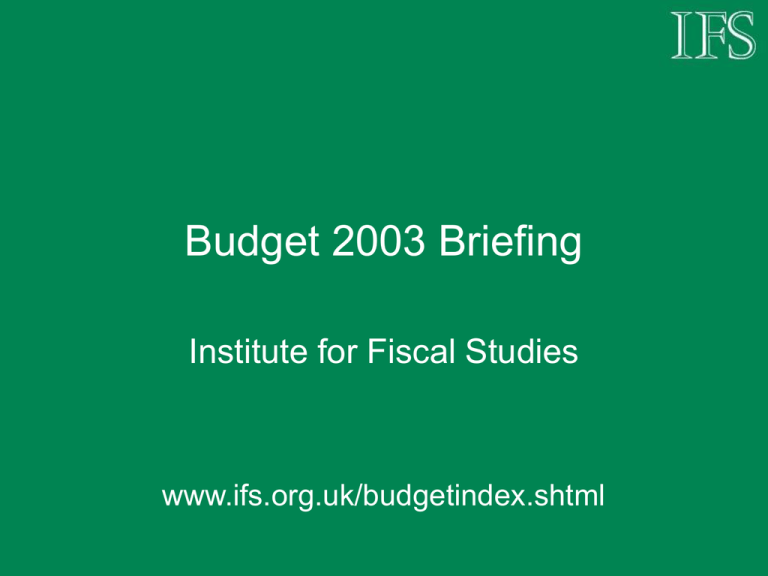
Budget 2003 Briefing Institute for Fiscal Studies www.ifs.org.uk/budgetindex.shtml Measures affecting households Matthew Wakefield Outline • Distributional analysis of measures directly affecting households • Child Trust Fund The Measures • £100 per year if aged 80+ • Housing Benefit disregard • Duty freeze on spirits, cider, sparkling wine The Measures • £100 per year if aged 80+ • £ 180m • Housing Benefit disregard • £ 45m • Duty freeze on spirits, cider, sparkling wine • £ 30m • Total cost: £ 255m Distributional Effects Gain, % income 0.30 0.20 0.10 0.00 Poorest 2 3 4 5 6 7 8 9 Richest 8 7 6 5 4 3 2 or es t 9 Ri ch es t Po Gain, % income Distributional Effects 6 4 2 0 -2 Effects by family type Family Type Average weekly change Budget 2003 Single parent 32p SE couple w kids 26p Single pensioner 61p Pensioner couple 69p Effects by family type Family Type Average weekly change Budget 2003 Preannounced Single parent 32p £8.85 SE couple w kids 26p £2.72 Single pensioner 61p £7.55 Pensioner couple 69p £8.72 Measures omitted • Not affecting households directly • Company car tax (+£125m) • Anti-VAT fraud (+£235m) • Fuel duty freeze (-£300m in 2003/04) • The Child Trust Fund (-£235m) The Child Trust Fund • Endowment at birth £250 / £500 • Cost: £ 235million • • • • Additional contributions from family/friends Accessible at 18 No restrictions on how funds can be spent Open market competition The Child Trust Fund: issues • Full proposals in summer • Further state contributions? • Incentives to family/friends? • Accounts by 2005 Why a Child Trust Fund? • Change distribution of wealth for young adults: • £ 250 to £ 600 • £ 500 to £ 1200 • Accurately targeted? • regular testing Why a Child Trust Fund? • Change distribution of wealth for young adults • Lump-sum to 18 year olds: ‘Asset effect’ • Plus learn • forward planning and • managing financial assets • Alternatives Conclusions • CTF new, will help a certain group • Small set of changes to taxes / benefits The Public Finances Christine Frayne Changes since November PBR • GDP forecast changes : • 2003: 2½–3% to 2–2½% • 2004: 3–3½% unchanged • 2005: 2¾–3¼% to 3–3½% Changes since November PBR • Budget measures : • 2003-04: - £0.5bn, (+ £0.3bn with margin reset) • 2004-05: - £0.3bn (- £1.2bn with margin reset) • 2005-06: + £0.1bn (- £1.6bn with margin reset) Meeting the golden rule? Cyclically adjusted current budget surplus Percentage of GDP 3.0 Budget 2002 PBR 2002 Budget 2003 2.0 1.0 0.0 -1.0 -2.0 -3.0 Year 96–97 97–98 98–99 99–00 00–01 01–02 02–03 03–04 04–05 05–06 06–07 07–08 Source: HM Treasury Increase in spending £ billion Change since PBR 2002-03 2003-04 2004-05 2005-06 1.2 0.9 3.0 4.9 – War contingency reserve – AME reserve (reduced CMF spending) – Social security benefits – Local authority self-financed expenditure – Higher debt interest spending Revenue forecasts Receipts – Budget 2002 Receipts – PBR 2002 Receipts – Budget 2003 Percentage of GDP 42 40 38 36 34 32 30 96–97 97–98 98–99 99–00 00–01 01–02 02–03 Year 03–04 04–05 05–06 06–07 07–08 Source: HM Treasury Change in revenue forecasts £bn 2002-03 2003-04 2004-05 200506 2006-07 –10.7 –14 –9 –2 0 Equity prices –1 –3½ –5 –5 –5 Compliance and enforcement 0 2½ 3½ 4 4 Financial company profits –5 –6 –4½ –1½ –1 Other economic & forecasting effects –5 –5½ -2½ 0 1½ Total nondiscretionary changes Source: HM Treasury Conclusions • Treasury forecasts: • Golden rule to be met over current economic cycle • Higher borrowing only temporary • But how cautious are these forecasts? • IFS Green Budget forecasts: £4bn to £11bn tax increases • Additional spending pressures: • Child poverty target • World-class public services? Budget 2003 Briefing Institute for Fiscal Studies www.ifs.org.uk/budgetindex.shtml

